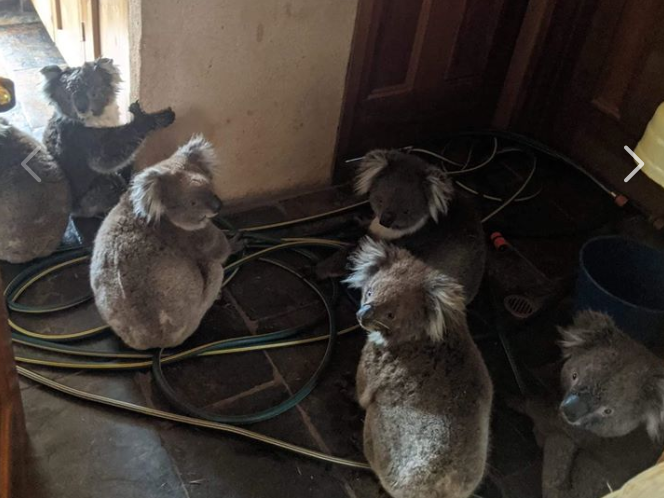Firefighters save group of koalas from Australian bushfires
Concern for marsupials skyrockets as thousands likely killed by blazes

Your support helps us to tell the story
From reproductive rights to climate change to Big Tech, The Independent is on the ground when the story is developing. Whether it's investigating the financials of Elon Musk's pro-Trump PAC or producing our latest documentary, 'The A Word', which shines a light on the American women fighting for reproductive rights, we know how important it is to parse out the facts from the messaging.
At such a critical moment in US history, we need reporters on the ground. Your donation allows us to keep sending journalists to speak to both sides of the story.
The Independent is trusted by Americans across the entire political spectrum. And unlike many other quality news outlets, we choose not to lock Americans out of our reporting and analysis with paywalls. We believe quality journalism should be available to everyone, paid for by those who can afford it.
Your support makes all the difference.Firefighters in Australia are being commended for saving a group of koalas from bushfires currently ravaging the country.
The blazes, which have scorched an area the size of Belgium since they began in October, have likely killed thousands of the animals, which are vulnerable to extinction.
As fires in the Adelaide hills destroyed hundreds of buildings and more than 70 homes, leaving one man dead, many citizens commended the bravery and selflessness displayed by firefighters.
And in a post that has since gone viral, one group of firefighters were lauded for stopping to save six koalas while battling the deadly blaze.
Shared by Janelle Michalowski, the image shows the furry marsupials huddled together in a hallway, one of them gripping the wall.
“Amazing work by a man named Adam and his mates who pulled these guys out of harms way at Cudlee Creek and into safety,” Ms Michalowski wrote. “Koala Rescue are all over it. Well done fellow south Australians. Fantastic job!
“Adam is a fire fighter and currently working out in the field. He has made everyone’s day.”
While Adam has not been identified further, another local firefighter named Adam Francis wrote on the post that his team had also rescued three koalas and he was caring for one at his home.
Concern for the safety of koalas has skyrocketed since the blazes began, with a fundraising effort to help the animals becoming the most successful GoFundMe campaign in the country’s history.
At the start of December, New South Wales held a parliamentary inquiry into the koalas’ plight, after millions of hectares of forest and habitats were destroyed in fire.
Koalas “really have no capacity to move fast enough to get away” from the unprecedented and rapidly spreading fires, Nature Conservation Council ecologist Mark Graham told the inquiry.
“The fires have burned so hot and so fast that there has been significant mortality of animals in the trees, but there is such a big area now that is still on fire and still burning that we will probably never find the bodies,” Mr Graham said.
“We’ve lost such a massive swath of known koala habitat that I think we can say without any doubt there will be ongoing declines in koala populations from this point forward.”
Prime minister Scott Morrison has finally returned from his holiday in Hawaii and, while conceding climate change was affecting weather patterns, claimed it was "not credible" to link the fires to global heating.
This spring has seen an unprecedented season of bush fire risk in every state and territory, with record-breaking heat and extremely dry conditions exacerbated by low humidity and strong winds, Forest Fire Danger Index (FFDI) statistics show.
While Australia has been experiencing drought for several years, the extreme heatwave currently engulfing the country is largely caused by a positive Indian Ocean Dipole – an extreme imbalance in surface temperatures between the ocean’s east and west, which is at its highest in 60 years.
Scientists believe the dramatic warming of the world’s oceans is fuelling greater unpredictability in events such as the Indian Ocean Dipole, El Nino and La Nina.
Even small changes to these events can impact large changes upon weather systems on opposite sides of the globe.
Join our commenting forum
Join thought-provoking conversations, follow other Independent readers and see their replies
Comments